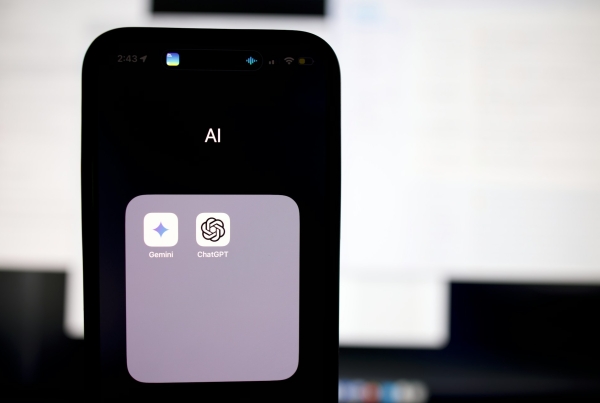As artificial intelligence continues to evolve, businesses are integrating AI across various functions, including marketing, customer service, data analysis, and beyond. However, with AI’s power comes the responsibility to manage its risks and complexities. That’s where a well-crafted AI policy becomes crucial. This article will discuss why your company needs an AI policy and outline steps for creating one, highlighting key insights from our recent podcast with VoyAIge Strategy, where experts Dr. Tommy Cooke and Dr. Christina Catenacci shared their strategy for building a tailored AI policy.
What Is an AI Policy?
An AI policy is a formal set of guidelines, principles, and rules that outline how AI should be developed, implemented, and governed within an organization. It typically covers essential aspects like data privacy, security, ethical considerations, and compliance with legal regulations. Importantly, an AI policy sets a framework to ensure that AI is used responsibly and aligns with the organization’s mission, values, and objectives.
During our podcast with VoyAIge, Catenacci emphasized that an AI policy should be unique to each organization. Rather than relying on a generic template, she explained that a successful AI policy is customized to address specific needs and potential risks associated with the organization’s AI applications. This approach provides clarity for employees and stakeholders, ensuring that AI is applied consistently, ethically, and effectively.
Why Does Your Company Need an AI Policy?
AI’s transformative power is undeniable, but with great potential also comes significant risk. Below are some reasons why your company needs a robust AI policy.
1. Mitigating Risks and Ensuring Compliance
AI can automate complex tasks, but it can also amplify risks, especially concerning data privacy and security. With regulations like GDPR and CCPA enforcing strict data protection guidelines, companies face penalties if they misuse personal data or violate user privacy. An AI policy can outline how AI interacts with data, helping your organization adhere to regulatory requirements and avoid costly penalties.
2. Protecting Your Company’s Reputation
Public trust in AI is still growing, and customers are wary of how companies use their data. Implementing an AI policy that prioritizes ethical use helps your company build trust by showing customers and stakeholders that it’s committed to using AI responsibly. By clarifying how AI will (and won’t) be used, your organization can prevent potential PR crises and demonstrate its commitment to transparency and integrity.
3. Aligning AI Usage with Business Goals
Without clear guidelines, AI implementations may diverge from the organization’s strategic objectives. An AI policy ensures that each AI project aligns with your company’s mission and goals, focusing efforts on value-driven applications. For instance, an AI policy might prioritize AI projects that improve customer service while limiting the use of AI in areas that don’t directly contribute to the business’s core values.
4. Enhancing Operational Efficiency
Establishing clear guidelines for AI usage can streamline processes and reduce ambiguity. With an AI policy, employees understand the protocols for using AI, from selecting data sources to deploying AI models. By defining AI governance and decision-making roles, an AI policy simplifies operations, enabling your company to harness AI’s potential efficiently and consistently across departments.
5. Avoiding the Pitfalls of Generic Policies
As discussed in our podcast episode, using a generic AI policy template can leave your company vulnerable. Cooke noted that while templates can provide a useful starting point, they often lack the specificity required to address unique organizational needs and risks. By crafting a customized policy, your organization can avoid the common pitfalls of a one-size-fits-all approach, tailoring your AI policy to fit the specific workflows, legal obligations, and risk tolerance of your company.
Steps to Get Started with an AI Policy
Implementing a tailored AI policy may seem daunting, but following a structured approach can simplify the process. Drawing from the strategies discussed in our conversation with VoyAIge, here are steps to create an effective AI policy for your company.
1. Identify Key AI Stakeholders
The first step is identifying the stakeholders who will shape, implement, and oversee the AI policy. This group typically includes executives, IT specialists, data scientists, legal advisors, and representatives from departments that will use AI directly, such as marketing or customer service. Including diverse perspectives ensures that the policy reflects a comprehensive understanding of AI’s potential impact across the company.
2. Define Your AI Objectives and Scope
Before diving into policy creation, it’s essential to clarify what you aim to achieve with AI. Start by defining the scope of your AI initiatives—where and how will AI be applied? This step involves setting clear objectives, whether it’s enhancing customer experience, optimizing operations, or generating insights. By narrowing the scope, you can create guidelines relevant to your specific use cases.
3. Address Data Governance and Privacy
Data is the foundation of AI, and handling it responsibly is critical. Your AI policy should include strict guidelines for data governance, including how data is collected, processed, and stored. Addressing privacy concerns—such as anonymizing data or limiting access—demonstrates a commitment to safeguarding sensitive information. The policy should also clarify the types of data allowed in AI applications and how to handle data securely.
4. Establish Ethical and Compliance Guidelines
Ethics is a significant focus in any AI policy, given the technology’s potential to impact society. Your AI policy should incorporate ethical guidelines on fairness, transparency, accountability, and inclusivity. Addressing compliance requirements is equally important; include guidelines to ensure that AI applications comply with applicable laws and regulations in each jurisdiction where the technology will be used.
In our podcast discussion, Tommy Cooke noted that ethical and compliance considerations often require a nuanced approach that a template cannot provide. Tailoring your AI policy to address specific ethical concerns unique to your industry and location can help prevent misuse or unintended consequences.
5. Outline Roles and Responsibilities
Creating an AI policy isn’t just about setting guidelines; it’s also about assigning clear roles and responsibilities. Who will oversee AI governance? Who ensures compliance? Your policy should designate individuals or departments responsible for maintaining AI ethics, managing data, and handling any incidents or malfunctions. These roles help create a structured, accountable framework for AI usage in your company.
6. Implement Risk Management Protocols
Risk management is a crucial component of any AI policy. Consider potential risks associated with AI applications, from data breaches to algorithmic bias, and define protocols for mitigating these risks. Include contingency plans for incidents like AI malfunctions or security breaches, and set up monitoring systems to identify risks early.
7. Plan for Continuous Monitoring and Policy Updates
AI is constantly evolving, so your AI policy should be flexible enough to adapt to new technologies, regulatory changes, and business needs. Develop a schedule for regularly reviewing and updating the policy, incorporating feedback from employees and stakeholders. Ongoing training and awareness programs can ensure that staff stay informed about the latest best practices, tools, and guidelines related to AI.
8. Educate and Train Your Workforce
To ensure effective AI adoption, companies need to equip their employees with the knowledge and skills to use AI responsibly. Training programs should educate employees on the AI policy, covering topics like data privacy, security, and compliance. This empowers staff to understand the limitations and ethical considerations of AI, making them more effective stewards of your organization’s AI initiatives.
The Importance of a Tailored AI Policy
Our podcast with VoyAIge’s Tommy Cooke and Christina Catenacci highlighted the risks associated with adopting a one-size-fits-all AI policy. Using a generic template might seem convenient, but it can fail to address specific issues your organization faces. For example, if your company heavily relies on customer data, a template may lack the detailed data governance protocols required to ensure compliance and privacy.
By taking a customized approach, your company can design an AI policy that directly addresses its unique needs, ensuring that the policy is both relevant and effective. VoyAIge’s step-by-step approach to policy customization emphasizes assessing your specific AI use cases, defining appropriate guidelines, and setting clear boundaries for each application. This method can help prevent common pitfalls, such as unclear protocols, inadequate security measures, or lack of compliance, which often arise from generic policies.
Final Thoughts: Setting the Foundation for Responsible AI Use
Developing an AI policy is a critical step for any organization embracing AI. As discussed in episode 3 of our AI Masterclass Series with VoyAIge, a tailored AI policy isn’t just a document; it’s a framework that promotes responsible, transparent, and effective use of AI. By establishing clear guidelines, roles, and risk management practices, you can help your organization navigate the complexities of AI, fostering innovation while minimizing potential risks.
Ready to take the next step? Don’t miss episode 3 of our AI Masterclass Series with Tommy Cooke and Christina Catenacci for a detailed look at creating a custom AI policy. They share practical strategies to get started and explain how an AI policy can become a strategic asset that aligns with your company’s values and goals. Listen now to discover how a tailor-made AI policy can empower your organization to harness AI responsibly and successfully.
About IN2communications
IN2communications is an award-winning digital marketing and web design agency helping hundreds of B2B organizations create awareness, boost consideration rates and generate sales leads.
Our awesome team provides experienced expertise in the following areas: Creative Strategy, B2B Campaigns, Web Development, Video Production, Social Media, Paid Advertising, SEO, Email Campaigns, Blogging, Presentations, Webinars and remarkable Content Creation.



